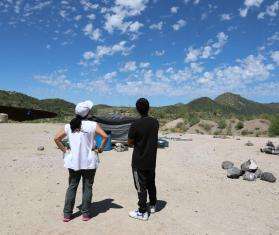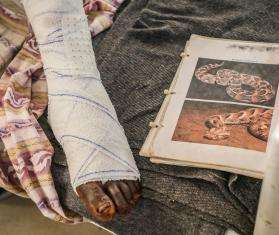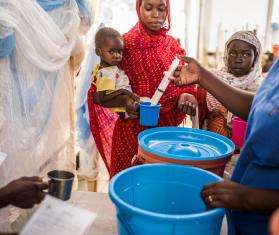Guatemala is a critical point in the migration route across Central America, and for many migrants, it’s one of danger, insecurity, and uncertainty. Migrants have shared with Doctors Without Borders/Médecins Sans Frontières (MSF) teams stories of violence and abuse, including sexual violence, extortion, and threats. In response, MSF has strengthened its response in Guatemala over the past two years to address the physical and mental health needs of people on the move.
“We did not have any difficulties on the way to Guatemala,” says Edinberto, a 36-year-old Colombian man who left his country in search of a better life for his family. “They shot at the bus, but nothing happened to us.” Although he recounts the event with apparent calm, he witnessed an attack on a bus with several migrants. His story is just one of hundreds that reveal the vulnerability of migrants on their journey.
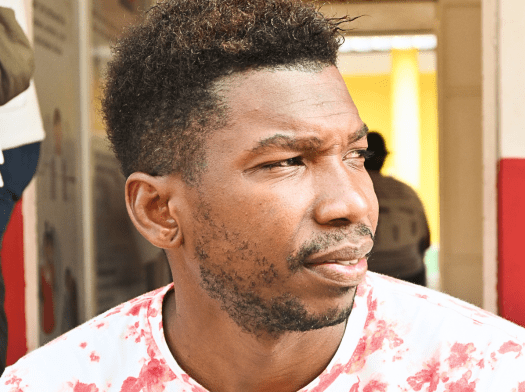
Guatemala 2024 © Fernando Alvarado/MSF
Edinberto
"It was normal for us to go through the jungle because we have worked in the fields. We had not had any difficulties on the journey until we arrived here. The bus was shot at, but nothing happened to us. If you want to migrate, don't bring your family. I tell the Guatemalans to be more supportive because we only want to move forward. We are not going to stay in your country."
"The migration route is not easy," says Carmen López, an MSF doctor in Esquipulas. "Every story I have heard from the people I serve on a daily basis tells of the endless difficulties ... and different degrees of violence that they have suffered along the way and even before making the decision to migrate."
According to data from the National Statistics Institute, in 2023 there was an increase in the number of homicides in 118 municipalities (about 35 percent of the national total) compared to 2022. The homicides were concentrated in the center of the country and in municipalities bordering Honduras, El Salvador, and Mexico.
Ennys
"It has not been an easy journey, but with God's help everything is possible and now I am here telling my story. I left through Necoclí, a part of Colombia, and the next day we managed to get into the jungle. It was not easy because it rained, and we had to camp in the mountains knowing that we had the risk of the rivers rising and being exposed to animals. I am traveling with my dad, mom, two children, and our pet. We are fighting for a better life."
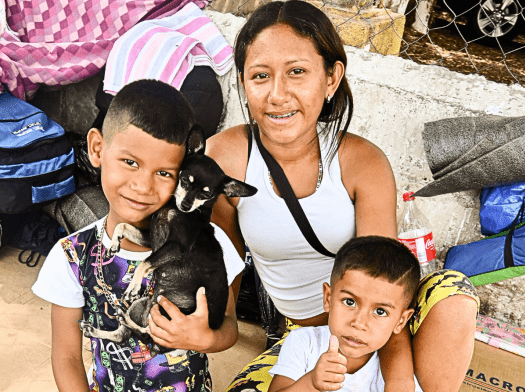
Guatemala 2024 © Fernando Alvarado/MSF
At the border care points of Tecún Umán (San Marcos) and Esquipulas (Chiquimula), MSF has seen the serious consequences and needs of people on the move over the past two years.
For Ediberto, the journey has been difficult and exhausting, especially the extortion: “The people of each country know that we are migrants; they want to take our money one way or another.”
More families and children are migrating for a better future
More than 100,000 people on the move traveled through Guatemala from April to September 2023, according to the International Organization for Migration. In recent years, MSF has seen more families, children, adolescents, and elderly people migrating, overcoming innumerable difficulties and risks including abuse, arbitrary detention, and inhumane economic sanctions, stripping their dignity and well-being.
In 2023, MSF documented more than 2,000 survivors of violence and more than 3,500 incidents of violence and rights violations in Guatemala. For 274 people, incidents of extortion, persecution, and gender-based violence were determining factors when they decided to leave their countries. “We have seen people with guns,” says Edinberto.
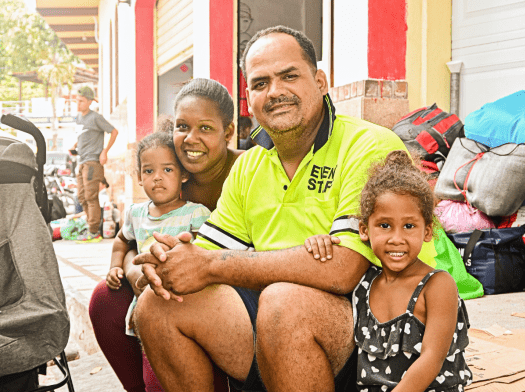
Guatemala 2024 © Fernando Alvarado/MSF
Elián
"The shortage of work made me leave Venezuela. We left with my family and on the way we had some health problems such as vomiting, diarrhea, and swollen feet. The truth is, it’s difficult to leave one country and enter another, because everything is very fast. My dream is to get to the United States, put my daughters in school, and work to have a house and help my family. We keep the love, respect, and affection in the family to continue our journey. I would like people along the way to be kinder to those of us who migrate."
These conditions seriously affect migrants’ physical and mental health, leading to stress, depression, psychological trauma, and grief. Often, the difficult conditions in which migrants travel also result in health issues such as respiratory infections, acute diarrhea, skin conditions, and gastrointestinal illnesses. In 2023 alone, MSF teams provided more than 12,500 comprehensive consultations at the country’s service points as the number of patients increased.
"Through us, they can get knowledge on mental health, sexual violence and family planning,” says MSF health promoter Rosinés Pérez. “Empowering them helps [them] so they can use our services, and this makes the journey less burdensome. ”
Rosendo
"I am a painter and gardener. I have no family; I never married. I have been in Esquipulas for two months because I am working to make money. I have a vision problem and I need glasses to read. Sometimes I eat and sometimes I don't eat. With my age, it is difficult for me to work. In Esquipulas, people have helped me to move forward. My dream is to find a job and better myself. If I could communicate with my mom I would tell her that I am fine."
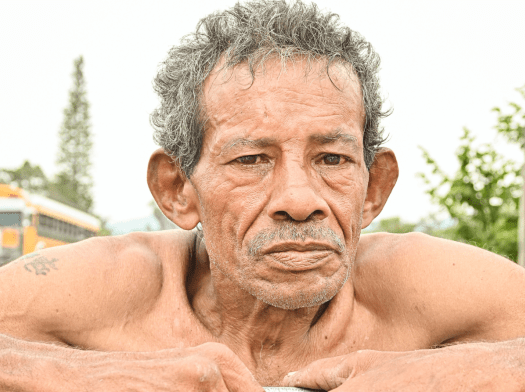
Guatemala 2024 © Fernando Alvarado/MSF
Documenting the migration journey
While providing medical and mental health care to migrants in Guatemala, MSF teams have documented their stories, including their experiences and expectations as they pass through the country. Many migrants highlight the need for more empathy toward them, explaining that they only want to cross the country and fulfill their dreams.
“If you want to migrate, don’t bring your family,” says Edinberto. “I tell Guatemalans to be more supportive because we just want to move forward; we are not going to stay in their country.”
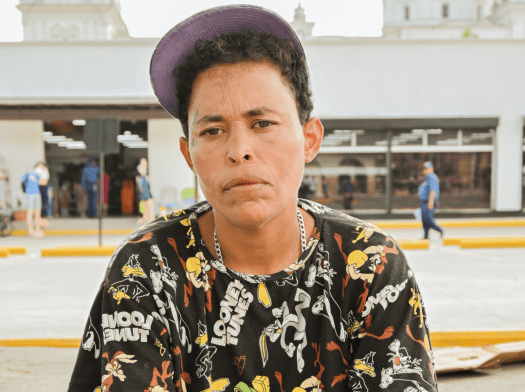
Guatemala 2024 © Fernando Alvarado/MSF
Dennis
"In the jungle there is a river and the experience was difficult—too much swamp, too [many] dead. I almost drowned. On the road they wanted to abuse me. Now I am trying to raise money so we can move forward. At the moment I am cleaning windows, but my dream is to work and get to the United States, so I can buy a house in Venezuela."
MSF teams also hear stories of xenophobia, extortion, threats, and sexual violence. For many migrants, Guatemala is the most difficult part of their journey due to abuse, unjust detention, and economic sanctions.
"Despite all the adversity ... many people still stand in solidarity with others and go the extra mile to help others in need," adds López. "We must be understanding, supportive, and respectful with the migrant population."
Nancy
"I left my country to look for a better life for my teenage son, my daughters, and my grandchildren. We have been [traveling] for four months and we have encountered health difficulties—I have hypertension and I retain liquids ... Sometimes fear attacks me and I feel that I am going to be late and I want to keep going, but my children have given me a lot of strength. In every country there is xenophobia and that has been difficult ... My dream is to have a peaceful life where my children and grandchildren have a better future."
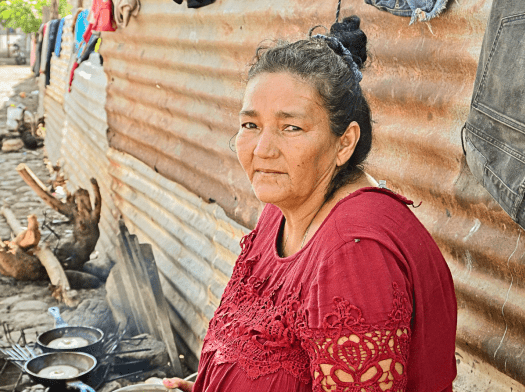
Guatemala 2024 © Fernando Alvarado/MSF
Thousands of people are fleeing their homes every day in search of safety, only to face more violence and abuses along the way. This is a crisis that requires a global response. MSF calls on governments and authorities in transit countries like Guatemala to put in place mechanisms to end violence and abuse against migrants along migration routes, as well as to guarantee their protection—particularly for children and women, who make up a large portion of people on the move. Ensuring humanitarian assistance to all migrants is a duty.

